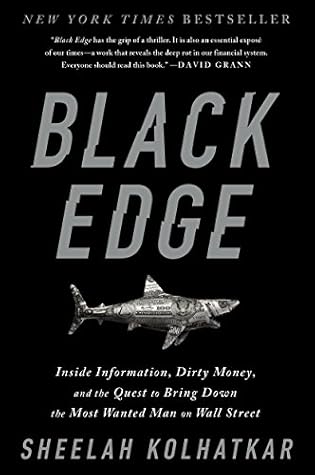More on this book
Community
Kindle Notes & Highlights
Read between
November 21 - November 23, 2018
Martoma scheduled an appointment through GLG to meet with Gilman a few months later at a medical conference in Seattle, but Martoma canceled the meeting. They never saw each other again.
“Steve didn’t like losing money,” Horvath said later—a mild understatement. “You were kind of in the bad books if you lost him money.”
The three interrelated groups involved in federal securities investigations—the SEC lawyers, FBI agents, and federal prosecutors—formed a sort of unsteady but codependent triumvirate. Although they often worked together closely and the FBI was technically a subsidiary of the Justice Department, each felt some resentment toward the others, and members of each group wondered whether they were putting in most of the effort and receiving insufficient credit for the cases being filed. The FBI prided itself on being the tough guys who did the dangerous work of flipping witnesses and wiretapping
...more
The SEC believed, not without reason, that it was the brains behind most securities cases—the only ones who truly understood the complex securities laws. Many SEC attorneys felt underappreciated and sometimes disrespected.
The prosecutors, who were drawn heavily from the graduating classes of elite Ivy League law schools, tended to believe that cases weren’t important until they got involved and did all the preparation required to bring them to trial. Preet Bharara’s pattern of announcing new charges at press conferences threw gasoline on the smoldering resentment. He usually thanked his “partners” at the FBI an...
This highlight has been truncated due to consecutive passage length restrictions.
the link seemed obvious: There was a major drug announcement that caused a stock to plunge; that announcement was made by a doctor who had access to the information well in advance; that doctor had been paid a fortune to consult with a trader at SAC, who was paid a fortune by Cohen, who made millions of dollars trading the stock the week before the news came out. It was like Occam’s razor, or the law of parsimony: Among competing hypotheses, the simplest one was usually correct. Any other explanation defied common sense.
The prosecutors had made an unusual move in the way they filed the charges. Rather than charging Martoma through an indictment—a formal criminal charge that comes after a federal grand jury has heard evidence against the defendant—Bharara’s office had charged Martoma only with a complaint. A complaint was the first step in a prosecution. An indictment meant that a grand jury had already found probable cause for the U.S. Attorney’s Office to go ahead with a prosecution. The prosecutors could have gone directly to the indictment, but they hoped that delaying that step would serve as an effective
...more
Preet Bharara, along with other top prosecutors around the country, had become increasingly sensitive to the possibility of losing big cases, especially ones that attracted a lot of news media attention. Ambitious young prosecutors from Ivy League law schools did not want to be associated with high-profile failures, especially when they were trying to build their careers and reputations. Bharara had watched prosecutors in the Eastern District lose a closely watched fraud case against two Bear Stearns hedge fund traders a few years earlier, in 2009, a case that had similarly seemed to be a
...more
In the past, the criminal prosecutors and the SEC had tried to coordinate the timing of their filings to avoid interfering with one other.
“SAC is a fund,” he said in his most obsequious voice. “It’s kind of like a mutual fund….” There was some snickering in the room. Describing SAC as similar to a mutual fund was sort of like describing the New York Yankees as a group of kids who played baseball.
In what came to be known as the “Newman decision,” the court said that in order for a trader to be prosecuted for trading on material nonpublic information, he or she had to be aware of the benefit the original leaker of the information had received. In many of the insider trading rings, traders got earnings or revenue numbers from other traders, knowing that they originated with someone inside the company and little else.
The court also ruled that the benefit the leaker received in exchange for sharing the information had to be something tangible, akin to money. Friendship or favor-trading on its own was not enough.
(Two years after the initial Newman decision, in December 2016, the Supreme Court ruled unanimously in an unrelated insider trading case that the Newman ruling had gone too far, and that valuable information given to a friend or a relative did count as an improper benefit, offering some relief to the Justice Department.)
There is a perception that in the years after the Michael Milken era, and especially since the financial crisis of 2008, it has become almost impossible, due to a lack of will or expertise, to prosecute corporate criminals who operate at the highest levels. The fear of suffering embarrassing losses after long, expensive trials has led to a kind of paralysis in law enforcement. The Justice Department was unable, or unwilling, to bring any senior Wall Street figures to face criminal charges for the widespread fraud that swept the financial system prior to 2008. Instead, it extracted billions of
...more


